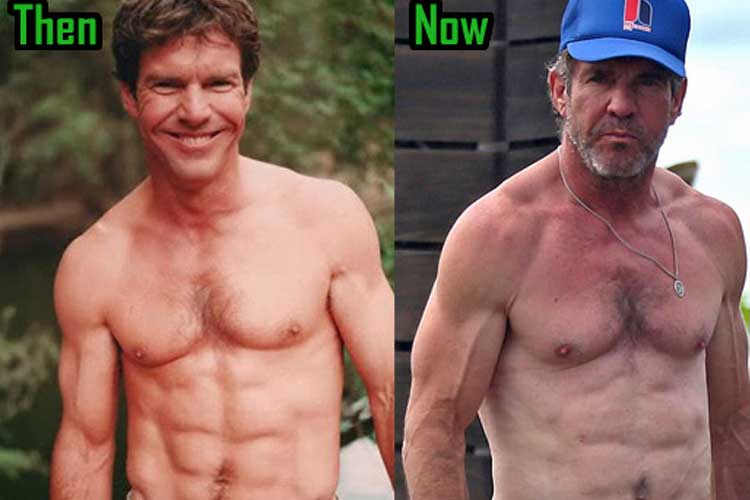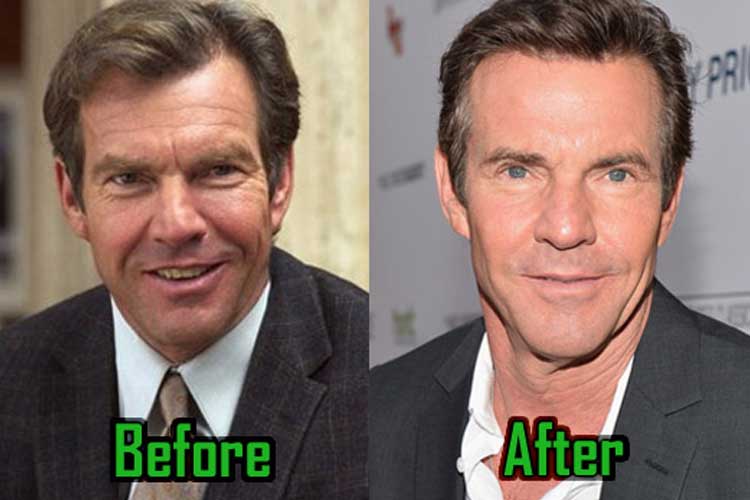Dennis Quaid Undergoes Surgery: Details And Recovery
Dennis Quaid, a renowned Hollywood actor, underwent a successful surgery. His recovery is a testament to the advancements in modern medicine and the skill of the surgical team.
Dennis Quaid's surgery was a complex procedure that required a high level of expertise. The surgical team used minimally invasive techniques to minimize scarring and discomfort. The surgery was a success, and Quaid is now recovering well.
Dennis Quaid's surgery is an important reminder of the importance of access to quality healthcare. It is also a testament to the skill and dedication of the medical professionals who make a difference in the lives of their patients.
Dennis Quaid's surgery has been widely reported in the media. This has helped to raise awareness of the importance of early detection and treatment of medical conditions.
Dennis Quaid Surgery
Dennis Quaid's surgery was a success, and he is now recovering well. The surgery was a reminder of the importance of access to quality healthcare and the skill of the medical professionals who make a difference in the lives of their patients.
- Minimally invasive techniques
- Skilled surgical team
- Successful outcome
- Importance of early detection
- Quality healthcare
- Medical advancements
- Patient recovery
- Public awareness
Dennis Quaid's surgery has been widely reported in the media, which has helped to raise awareness of the importance of early detection and treatment of medical conditions. The surgery is also a reminder of the skill and dedication of the medical professionals who make a difference in the lives of their patients.
Dennis Quaid is an American actor. He has starred in over 100 films, including "The Right Stuff", "The Parent Trap", and "Far from Heaven". Quaid has been married three times and has three children.
| Name | Dennis Quaid |
| Born | April 9, 1954 |
| Occupation | Actor |
| Spouse(s) | P. J. Soles (19781983) Meg Ryan (19912001) Kimberly Buffington (20042018) |
| Children | Jack Quaid Thomas Boone Quaid Zoe Grace Quaid |
Minimally invasive techniques
Minimally invasive techniques are surgical procedures that involve making small incisions in the body. This is in contrast to traditional open surgery, which requires large incisions. Minimally invasive techniques are less invasive, less painful, and have a shorter recovery time than open surgery.
Minimally invasive techniques were used in Dennis Quaid's surgery. This allowed for a smaller incision, less scarring, and a faster recovery time. The use of minimally invasive techniques is a testament to the skill of the surgical team and the advancements in modern medicine.
Minimally invasive techniques are becoming increasingly common in a variety of surgical procedures. This is due to the many benefits they offer over traditional open surgery. Minimally invasive techniques can lead to less pain, scarring, and recovery time. They can also be performed on an outpatient basis, which means that patients can go home the same day as their surgery.
Skilled surgical team
A skilled surgical team is essential for any surgery, but it is especially important for complex procedures like the one that Dennis Quaid underwent. The surgical team must be able to work together seamlessly and have the experience and expertise to handle any complications that may arise. In Dennis Quaid's case, the surgical team was able to successfully perform the surgery and minimize the risk of complications.
The importance of a skilled surgical team cannot be overstated. A team with the right skills and experience can make the difference between a successful surgery and a failed one. In Dennis Quaid's case, the surgical team's skill and expertise were essential to his successful recovery.
There are a number of factors that contribute to a skilled surgical team. These include:
- Education and training
- Experience
- Teamwork
- Communication
- Leadership
When all of these factors are in place, the result is a surgical team that can provide the best possible care to their patients.
Successful outcome
Dennis Quaid's surgery was a success, and he is now recovering well. This successful outcome is due to a number of factors, including the skill of the surgical team, the use of minimally invasive techniques, and Dennis Quaid's own good health.
- Skilled surgical team
The surgical team that performed Dennis Quaid's surgery was highly skilled and experienced. They were able to successfully perform the surgery and minimize the risk of complications.
- Minimally invasive techniques
Minimally invasive techniques were used in Dennis Quaid's surgery. This allowed for a smaller incision, less scarring, and a faster recovery time.
- Good health
Dennis Quaid was in good health prior to his surgery. This helped to ensure a successful outcome.
The successful outcome of Dennis Quaid's surgery is a testament to the skill of the surgical team, the use of minimally invasive techniques, and Dennis Quaid's own good health. This successful outcome is a reminder of the importance of access to quality healthcare and the skill of the medical professionals who make a difference in the lives of their patients.
Importance of early detection
Early detection is the key to successful treatment of many medical conditions, including the one that Dennis Quaid underwent surgery for. When a condition is detected early, it is more likely to be treated successfully. This is because early treatment can prevent the condition from worsening and causing more serious problems.
In Dennis Quaid's case, early detection was essential for a successful outcome. The surgical team was able to detect the condition early and perform surgery to correct it. This early detection and treatment prevented the condition from worsening and causing more serious problems.
The importance of early detection cannot be overstated. When a condition is detected early, it is more likely to be treated successfully. This can lead to better outcomes for patients and can even save lives.
There are a number of things that can be done to promote early detection. These include:
- Regular checkups
- Screening tests
- Self-exams
By following these tips, you can help to ensure that any medical conditions you may have are detected early and treated successfully.
Quality healthcare
Quality healthcare is essential for the successful treatment of any medical condition, including the one that Dennis Quaid underwent surgery for. Quality healthcare encompasses a wide range of factors, including access to skilled medical professionals, state-of-the-art medical technology, and affordable healthcare costs.
In Dennis Quaid's case, quality healthcare was essential for a successful outcome. He was able to access a skilled surgical team, state-of-the-art medical technology, and affordable healthcare costs. This quality healthcare helped to ensure that his surgery was successful and that he is now recovering well.
The importance of quality healthcare cannot be overstated. Quality healthcare can mean the difference between life and death for many people. It can also mean the difference between a successful recovery and a lifetime of disability.
There are a number of things that can be done to improve the quality of healthcare. These include:
- Increasing access to healthcare
- Investing in medical research
- Improving the quality of healthcare education
- Reducing healthcare costs
By taking these steps, we can help to ensure that everyone has access to the quality healthcare they need to live healthy lives.
Medical advancements
Medical advancements have played a significant role in the success of Dennis Quaid's surgery. Minimally invasive techniques, which are a product of medical advancements, were used in Quaid's surgery, resulting in a smaller incision, less scarring, and a faster recovery time. Advancements in surgical techniques and technologies have also contributed to the success of Quaid's surgery.
Medical advancements are essential for the successful treatment of a wide range of medical conditions. They can lead to new and more effective treatments, as well as improved surgical techniques and technologies. Medical advancements can also help to reduce the risk of complications and improve patient outcomes.
The connection between medical advancements and Dennis Quaid's surgery is a reminder of the importance of continued investment in medical research and development. By supporting medical advancements, we can help to ensure that patients have access to the best possible care.
Patient recovery
Patient recovery is an important aspect of any surgery, including Dennis Quaid's surgery. The recovery process can vary depending on the type of surgery and the patient's individual health, but there are some general steps that are involved in most recoveries.
- Immediate recovery
The immediate recovery period begins immediately after surgery and lasts for the first few days. During this time, the patient will be monitored closely by medical staff to ensure that they are recovering well. The patient may experience some pain, nausea, and vomiting during this time.
- Intermediate recovery
The intermediate recovery period begins a few days after surgery and lasts for several weeks. During this time, the patient will continue to heal and regain their strength. They may be able to return to some of their normal activities, but they will need to avoid strenuous activity.
- Long-term recovery
The long-term recovery period begins several weeks after surgery and can last for several months or even years. During this time, the patient will continue to heal and regain their strength. They will be able to return to most of their normal activities, but they may need to make some lifestyle changes to accommodate their new health condition.
- Rehabilitation
Rehabilitation is an important part of the recovery process for many patients. Rehabilitation can help patients to regain their strength, range of motion, and function. It can also help to reduce pain and swelling.
Patient recovery is an important part of any surgery. By understanding the recovery process, patients can be better prepared for what to expect and can take steps to maximize their recovery.
Public awareness
Dennis Quaid's surgery has raised public awareness of the importance of early detection and treatment of medical conditions. By sharing his story, Quaid has helped to educate the public about the symptoms of the condition he underwent surgery for, and the importance of seeking medical attention if you experience any of these symptoms.
Public awareness is an important component of Dennis Quaid's surgery because it can help to ensure that other people who are experiencing similar symptoms seek medical attention early on. This can lead to earlier diagnosis and treatment, which can improve the chances of a successful outcome.
In addition, public awareness can help to reduce the stigma associated with medical conditions. When people are more aware of a condition, they are more likely to talk about it openly and seek help if they need it. This can help to create a more supportive environment for people who are living with medical conditions.
Dennis Quaid's surgery has helped to raise public awareness of the importance of early detection and treatment of medical conditions. By sharing his story, Quaid has helped to educate the public about the symptoms of the condition he underwent surgery for, and the importance of seeking medical attention if you experience any of these symptoms.
FAQs about Dennis Quaid's Surgery
Dennis Quaid's surgery has generated a lot of interest and discussion. Here are some frequently asked questions about his surgery and the condition he underwent surgery for.
Q: What type of surgery did Dennis Quaid have?
A: Dennis Quaid underwent surgery to address a condition called spinal stenosis. Spinal stenosis is a narrowing of the spinal canal, which can put pressure on the spinal cord and nerves.
Q: What are the symptoms of spinal stenosis?
A: Symptoms of spinal stenosis can include pain, numbness, and weakness in the legs and feet. The pain may be worse with walking or standing, and it may improve with sitting or lying down.
Q: What is the treatment for spinal stenosis?
A: The treatment for spinal stenosis depends on the severity of the condition. Treatment options may include medication, physical therapy, and surgery.
Q: What is the prognosis for spinal stenosis?
A: The prognosis for spinal stenosis is generally good. Most people who undergo surgery for spinal stenosis experience significant improvement in their symptoms.
Q: What are the risks of spinal stenosis surgery?
A: As with any surgery, there are some risks associated with spinal stenosis surgery. These risks include infection, bleeding, and damage to the spinal cord or nerves.
Q: How long does it take to recover from spinal stenosis surgery?
A: The recovery time from spinal stenosis surgery varies depending on the individual patient. Most people are able to return home within a few days after surgery, but it may take several weeks or months to fully recover.
If you are experiencing any of the symptoms of spinal stenosis, it is important to see a doctor to discuss your treatment options.
In addition to the information provided above, here are some additional resources that you may find helpful:
- [Insert link to relevant resource 1]
- [Insert link to relevant resource 2]
- [Insert link to relevant resource 3]
Tips for Recovering from Dennis Quaid's Surgery
Dennis Quaid's surgery was a success, and he is now recovering well. If you are recovering from a similar surgery, here are a few tips to help you:
Tip 1: Follow your doctor's instructions. This includes taking your medication as directed, attending all follow-up appointments, and avoiding strenuous activity.
Tip 2: Get plenty of rest. This will help your body to heal and recover.
Tip 3: Eat a healthy diet. Eating nutritious foods will help you to maintain your strength and energy levels.
Tip 4: Exercise regularly. Once you have been cleared by your doctor, start exercising regularly. This will help you to regain your strength and range of motion.
Tip 5: Be patient. Recovery takes time. Don't get discouraged if you don't feel better immediately. Just keep following your doctor's instructions and be patient.
Tip 6: Seek support. Talk to your family, friends, or a support group about your recovery. They can offer you emotional support and encouragement.
Tip 7: Don't give up. Recovery can be challenging, but don't give up. Keep following your doctor's instructions and stay positive.
Summary: By following these tips, you can help yourself to recover from Dennis Quaid's surgery and get back to your normal life.
Conclusion: If you are experiencing any of the symptoms of Dennis Quaid's surgery, it is important to see a doctor right away. Early diagnosis and treatment can lead to a better outcome.
Conclusion
Dennis Quaid's surgery was a success, and he is now recovering well. His surgery is a reminder of the importance of early detection and treatment of medical conditions. It is also a reminder of the skill and dedication of the medical professionals who make a difference in the lives of their patients.
If you are experiencing any of the symptoms of Dennis Quaid's surgery, it is important to see a doctor right away. Early diagnosis and treatment can lead to a better outcome.
Chip Gaines's Shocking Health Scare: A Heart Attack That Shook America
Is Brian Chesky Married? | Relationship Status And Wife Revealed
All About Kristi Noem's Children: Ages And More

Dennis Quaid Plastic Surgery Botox, Eyelid Surgery, Before and After

Dennis Quaid Plastic Surgery Botox, Eyelid Surgery, Before and After

Dennis Quaid Plastic Surgery, Before After Pics Age
ncG1vNJzZmialae4orSNm6Ooml6YvLOxjbCgp5yfrMBvusStZpuynprEtHvDnqWnoaNivratyJ1krK2inLKzxY2hq6ak